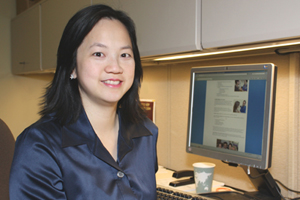
It's wrong.
"Even widely trusted sites like WebMD are not that accurate when it comes to adolescent reproductive health," says Dr. Sophia Yen, a Stanford University Med School instructor in Adolescent Medicine. She conducted an online review last summer and concluded many of the web sites weren't just incomplete — they were often wrong, wrong, wrong.
See Also:
With undergraduate researcher Alisha Tolani, Yen reported her results in March to the annual meeting of the Society for Adolescent Medicine, concluding that web sites "don't always incorporate changes to policy or to clinical recommendations that have occurred within the past five years." Between July and August, Yen's team performed a detailed assessment of the sexual health information online, a process she describes in an online video. "We did a Google search for phrases such as birth control, sexually transmitted diseases, emergency contraception, and IUDs, and looked at which web sites were the top 10 to 15 that came up on each of these topics." They cross-checked their list against Alexa's reports of U.S.-based traffic — but were still disappointed by the information they discovered. For example, "about half of the Web sites, including such highly trafficked destinations as Wikipedia and Mayoclinic.com, failed to provide accurate, complete information about emergency contraception," according to the study announcement by Stanford's School of Medicine.
Emergency contraception has been available over-the-counter since 2006 for people over 18, but 29% of the web sites Yen checked failed to mention this fact. She discovered 16 of the 34 sites correctly stated this information, but then failed to mention that in nine states it's also available over-the-counter without any age restrictions. And Yen also faults 10 of the 34 sites for failing to correct a common misconception — that emergency contraception is identical to the RU-486 abortion pill.

And Yen found that many web sites also failed to include the latest guidelines from the World Health Organization about Plan B emergency contraception. (The group recommends that the pills be taken as soon as possible after sex, adding that the latest they can be effective is five days after intercourse.)
Yen's interest stems from her work as a pediatrics instructor at Stanford's medical school, and as a specialist in adolescent medicine at the Lucille Packard Children's Hospital. In fact, the hospital's chief of adolescent medicine added a statement to the announcement. "Making the transition between childhood and adulthood can be tough on teenagers," said Neville Golden, MD, noting that teenagers have many questions about sexual health. "That's why Dr. Yen's research is so important.
"She has demonstrated that there is a tremendous amount of misinformation on the Web."
But do adolescents get their sex information the web? Yes. Yen cites two studies by the PEW research center plus a 2003 survey by the Kaiser Family Foundation, which determined that approximately 25% of teens acquire "some or a lot" of their sexual health information from the internet.
And though more than half of teenagers mistakenly thought they were immune to herpes if they were only kissing, this wasn't addressed by 69% of the web sites studied. (Only nine of 29 pages about STDs explained that herpes could be transmitted through kissing.) It's just one more example of ways health sites are failing their teenaged readers. "No studies have investigated the extent to which these myths exist and are perpetuated on the internet," Yen argues in her findings, adding that in the last five years, "several notable changes to policy and clinical recommendations have occurred."
Yen recommends that teenagers see a physician who specializes in adolescent medicine, and seek web sites reviewed by similar specialists (like the web sites associated with academic medical centers). She recommends Go Ask Alice, a question-and-answer service from Columbia University, the Center for Young Women's Health by the Children's Hospital Boston, TeensHealth by KidsHealth.org, and Planned Parenthood's Teen Wire. And she also recommends the book Our Bodies, Ourselves.
Ultimately, she suggests web sites "should consider more frequent reviews by health practitioners to contain accurate information consistent with such changes." She also has some advice for doctors — "be aware of myths on 'reputable health websites' and actively debunk them in clinical settings." And finally, she has some advice for teenagers.
"Be cautious about finding sexual health answers on the Web."
See Also:
Top Six Inaccurate Sex Facts on the Web
The D.C. Madam Speaks
Sex Expert Susie Bright Lets It All Out